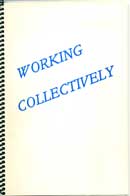

|
|

Working Collectively
Women's Self-Help Network for Change
Publisher: Women's Self-Help Network, Campbell River, CanadaYear First Published: 1984 Year Published: 1985 Pages: 50pp ISBN: 0-919537-17-0 Library of Congress Number: HQ1885.W67 1984 Dewey: 306.344 Resource Type: Pamphlet Cx Number: CX3218 A handbook for people wishing to form collectives, or established collectives seeking solutions to problems such as power imbalances, conflict meditation, and setting priorities. Abstract: "Working collectively," according to the Women's Self-help Network, "is difficult for people used to managing in a hierarchical, individualistic society." Their booklet WORKING COLLECTIVELY is a handbook for people wishing to form collectives, or established collectives seeking solutions to problems such as power imbalances, conflict meditation, and setting priorities. WORKING COLLECTIVELY includes a detailed procedure for consensus decisoin-making, a suggested agenda (to help solve the "endless meeting" syndrome) and a "burnout self exam" for collective members. One striking tactic proposed in the book is the use of "paranoid fantasy as a communication tool. We argreed that when someone feels paranoid, that is that something is going on which is making her feel uneasy or afraid, there is indeed something going on." The Women's Self-Help Network suggests discussing the paranoid fantasies (usually about the feelings of ohter collective members) with the appropriate people in an effort to resolve the problem. Table of Contents: Why Operate Collectively Decisions Structure for Making Decisions Jobs Meetings Membership Political and Value Agreements Difficulties No Consensus Power Imbalance Endless Meetings Individual Crisis Conflict Accountability Lack of Rewards Tools Pressing Process Check-In Constructive Criticism Paranoid Fantasies Resentments Priorize and Time Collective Business Postponement Time Out Light and Livelies Rounds Evaluation Appreciations Affirmations Facilitator's Duties Burn-Out Self Exam Ritual and Caretaking Committee Peer Counselling Mediation References and Other Resources Subject Headings |